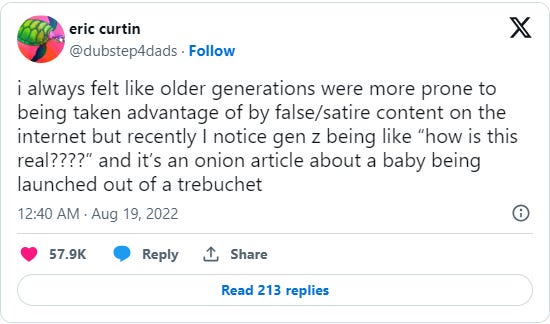Welcome to the latest edition of The Gen Zer. This week, we discuss a recent study by Google and take a look at the rental crisis, brat summer, Gen Z-led protests in Kenya and more.
Do Gen Zers care about the truth?
A newly released study by some of the folks at Google found that Gen Zers spend most of their time online unconcerned with the truth, because they are simply looking to pass the time.
The researchers found that the participants adopt different mindsets and emotional states depending on what they’re doing online. As a generation we mostly go online just to avoid boredom, and the mindset we do this with is one of apathy. We can apply critical thinking skills to assess the validity of what we read and see, but for the most part we don’t care enough to.
The study also found that Gen Zers are prone to skip an article if it’s too long and jump straight to the comments instead. We don’t want anything that requires us to think too hard, nor anything that’ll upset us emotionally. And when we do care about acquiring knowledge, it’s generally with the aim of learning what we need to know to remain cool and up-to-date with our social groups.
 Tiktok failed to load.
Tiktok failed to load.Enable 3rd party cookies or use another browser
Overall the study doesn’t paint the rosiest picture of our generation. It’s worth remembering that it was a qualitative study involving long interviews with a few participants, rather than a broader piece of research involving more people, but nonetheless there is still something worrying in the findings.
In 1891 Oscar Wilde, ever the modernist, wrote that boredom is ‘the one sin for which there is no forgiveness.’ As a generation we seem to embody this sentiment. It’s the fear of boredom that drives us online, not the search for truth, and so our attitude is one of unconcern rather than scrutiny.
For Gen Z, boredom is the cardinal sin. We’re a TikTok generation, the study suggests, and truth may be the collateral damage.
So . . . how concerned should we be?
Before social media, you’d likely get your news from a newspaper and then get your social fix through seeing friends in person. You might buy a magazine for something that’s more in-between the two, but even then the lines were still clear.
For Gen Zers, social media means that the lines are wayyyy more blurred. We don’t really see much difference between going online for news versus for social interaction. You can find both on Instagram or TikTok, after all. The internet has created this ever-fluctuating amalgamation where everything is immediate and nothing is written in stone.
Even worse, although we generally assume that our algorithms are determined by our interests and values, it’s often the other way around. This matters less when the content is all funny videos and dance trends, but when the content is political or informational there’s obviously a much larger problem.
With a newspaper, the editor chooses the content and the views. There’s a relationship between the editor and the reader, and over time that relationship might steadily incorporate a level of trust. But with social media, well, how could you ever build trust in an algorithm? Do any of us really know how they work, or what metrics they use for promoting one video and hiding another?
For Gen Zers (and for everyone else, too) there’s too much obscurity and noise out there. It’s hardly surprising that Gen Zers show so much apathy online or regularly turn to absurdist humour. Sometimes all you can do is shrug or laugh.
There are some rays of light, despite Google’s findings. A lot of the content we consume is from influencers and creators we choose to follow. Putting the intentionality back is important here, since it allows for a relationship capable of trust. You can decide for yourself if your favourite online historian, neuroscientist or cultural critic has the right credentials and motives. So it’s not entirely true that we’re just consuming blindly from the algorithm.
Checking the comments isn’t all bad, either. After all, the scientific method basically relies upon broadening your data inputs and doing your best to disprove your hypothesis. Checking the comments is a quick (if fallible) way of seeking out objections and alternatives to the original article’s main point of view. We build trust by being sceptical, and Gen Zers are finding novel ways of doing that.
So: there’s some cause for concern, but it’s really not all that bad.
Gen Zers go online for lots of reasons, and failing to critically assess everything we see isn’t an issue so long as we’re not embracing it either.
As a generation, we’re pretty good at treating everything with a pinch of salt. Sure, we might not fact check a TikTok, but most of us aren’t going to base our lives around those TikToks, either. Previous research has found that most disinformation is consumed by a minority of users who choose to seek it out. The majority of Gen Zers aren’t out here being radicalised.
There’s still a lot to be concerned about. A generation that seeks primarily to avoid boredom through short-form content, and thus avoids anything longer and more long-term beneficial, might face some problems further down the line — but Gen Z is not a monolith. Go online and there are loads of positive trends, growing communities, interesting conversations being had all the time.
I’ve seen some TikToks recently with the sentiment: ‘Realising I believe everything I see on TikTok just like my parents believe everything they see on Facebook.’ There’s a lot of self-awareness in the discourse online, and many people are good at pointing out our collective flaws and finding positive solutions. There’s still hope for the future, then.
After all, nothing is set in stone.
Gen Z around the Web
the latest stories in youth culture and changing trends . . .
Meet generation boomerang (the face)
In the 1980s, almost half of 18-to-34-year-olds lived in a property they owned. Now, around 40 per cent have moved back in with their parents – if they’ve ever moved out at all. Why does it feel like the rules of adulthood are being rewritten, and not in a good way… Read more
Understanding the Gen Z-led protests in Kenya (thred)
In recent weeks protests have been sweeping across the country, led by Gen Zers who are deeply unhappy with a new Finance Bill. Read more
Why Gen Z’s Trust is so difficult for brands to come by (morning consult)
Apparently as a generation we also have trust issues: 95% of the brands Morning Consult looked at have lower trust ratings with Gen Z compared to all U.S. adults. Read more
It’s a Brat Summer (papermag)
Summer 2024 is lime green and it’s all down to Charlie XCX. Read more
Are Gen Z picking up the phone less? (thred)
In a world of instant messaging, is the old-fashioned phone call becoming a relic of the past? Read more
That’s all for this week! Make sure to subscribe for the latest on Gen Z and youth culture, and check out The Common Thred for a weekly roundup of the latest news, trends and thought pieces.
see ya soon,
Jeremy @ Thred Media








Fantastic read!